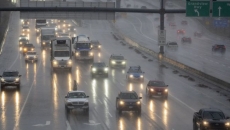As the Canadian broadcast system is upended by streaming, old-school media and telecom companies say they're struggling to compete and they want the country’s broadcast regulator to take a lighter touch.
The Canadian Radio-television and Telecommunications Commission (CRTC) is holding consultations on how the Canadian broadcasting system can survive the shift away from traditional TV to international streamers.
It’s a part of the regulator’s work on implementing the Online Streaming Act, which updated broadcasting laws to capture online platforms.
The CRTC launched a consultation in January to study market dynamics as Canadians move from traditional broadcasting and cable — which is subject to various CRTC rules and regulations — to streaming services dominated by international giants like Netflix, Amazon and Disney+.
Filings were due Monday and the CRTC also will hold a consultation hearing in May in Gatineau, Que.
In its submission, Rogers argued rules implemented by the CRTC to govern the traditional cable and satellite TV markets are now putting those companies at a disadvantage against online streaming companies.
"Many of the Commission’s existing regulatory tools are ineffective because they undermine the competitiveness of Canadian broadcasting undertakings vis-a-vis global streaming giants," Rogers argued in its filing.
"These tools — the vast majority of which are not required to achieve the Act’s policy objectives — have become a drag on the Canadian broadcasting system by inhibiting innovation, investment and risk-taking."
Rogers cited, among others, rules on mandatory distribution of some TV channels and on how providers have to package TV channels in cable offerings — including the requirement that TV providers have to offer a $25 basic cable package.
Bell asked the CRTC to "acknowledge that some deregulation of the traditional system is necessary."
It also argued that "to the extent that traditional broadcasters continue to carry an asymmetrical regulatory burden," they should be given "offsetting advantages."
Bell, which owns the Crave streaming service, also asked the CRTC to introduce new regulations on foreign streamers to promote Canadian and Indigenous content available through Canadian TV broadcasters and their affiliated streaming services.
In its filing, it listed a number of rules that apply to the traditional system but not to foreign streamers.
"While we would argue that many of these regulations were counterproductive even within a closed system, at least they were applied consistently to all participants," Bell said.
"However, now that foreign streamers have established a dominant position within an open Canadian broadcasting system, many of these rules significantly undermine the competitiveness of our services."
In their submissions, big U.S. streamers urged the CRTC not to impose regulations developed for the traditional cable and satellite system on the online market.
Paramount said the CRTC should "reject proposals to simply transpose prescriptive regulatory tools and requirements designed for a closed linear broadcasting system onto online undertakings."
Apple told the CRTC the current rules were developed mainly to address vertical integration in the traditional system, and those "tools are neither appropriate nor relevant for online undertakings."
It noted a rule that states a vertically integrated company that owns both broadcast channels and the cable company that carries those channels can’t give itself an undue preference.
Netflix told the CRTC it doesn’t have jurisdiction over the commercial terms and conditions under which content owners make their programs available.
"Therefore, the Commission must tread lightly and avoid overreaching into the economic relationships between online undertakings and other broadcast entities," it said.






